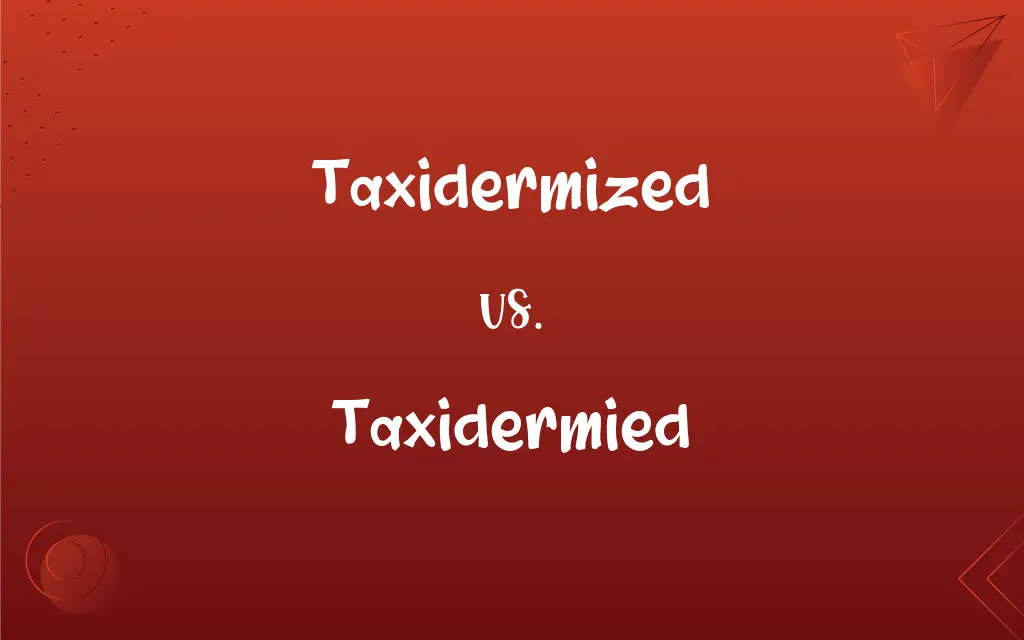Taxidermized vs. Taxidermied: What's the Difference?
By Aimie Carlson & Harlon Moss || Updated on May 21, 2024
Taxidermized refers to an animal that has been preserved through the process of taxidermy, while taxidermied is an alternative form of the word with the same meaning but is less commonly used.

Key Differences
Taxidermized describes an animal that has been preserved using taxidermy techniques. This term is more commonly found in literature and scientific contexts, reflecting the formal process of preserving an animal's body for display or study. Taxidermied, on the other hand, is a less frequent variant of the same term. It carries the same meaning as taxidermized but is used less often in both spoken and written English. While taxidermized emphasizes the meticulous process involved, taxidermied may come across as more colloquial or informal.
Both terms indicate that an animal has undergone the taxidermy process, but taxidermized tends to be preferred in formal and academic settings. Whereas taxidermied might be encountered in casual conversation or informal writing, it lacks the prevalence and formality of taxidermized.
In the context of describing an animal preserved through taxidermy, using taxidermized may convey a clearer and more precise message, especially in professional or educational settings. Conversely, taxidermied might be chosen for simplicity or ease of use in everyday language.
Choosing between taxidermized and taxidermied often depends on the audience and the context in which the term is being used. Formal documents and scientific discussions favor taxidermized, whereas casual conversations might more frequently feature taxidermied.
Both terms serve the same function, describing a preserved animal, but taxidermized is typically seen as the standard form. In contrast, taxidermied provides an alternative that, while understood, does not carry the same level of formal recognition.
ADVERTISEMENT
Comparison Chart
Usage Frequency
More common
Less common
Formality
More formal
Less formal
Context
Academic, scientific, professional
Informal, casual
Clarity
Clear and precise
Simpler, less precise
Audience Preference
Preferred in professional settings
May be used in everyday language
ADVERTISEMENT
Taxidermized and Taxidermied Definitions
Taxidermized
Treated by taxidermy techniques.
The taxidermized bird looked almost lifelike.
Taxidermied
Mounted for display using taxidermy.
The taxidermied owl sat on the mantle.
Taxidermized
An animal that has been mounted for study or exhibition.
The taxidermized bear stood in the corner of the room.
Taxidermied
An alternative form of taxidermized.
The taxidermied animals were part of the exhibition.
Taxidermized
An example of taxidermy.
She admired the taxidermized fox on the shelf.
Taxidermied
Treated by a taxidermist.
The taxidermied fish was impressive.
Taxidermized
Created by a taxidermist.
The taxidermized specimens were carefully crafted.
Taxidermied
An animal that has undergone taxidermy.
They kept a taxidermied squirrel in the study.
Taxidermized
Preserved using taxidermy.
The museum displayed a taxidermized tiger.
Taxidermied
Preserved through taxidermy.
The hunter brought home a taxidermied deer.
Taxidermized
Simple past tense and past participle of taxidermize
Taxidermied
Simple past tense and past participle of taxidermy
Taxidermied
Stuffed, having undergone taxidermy.
FAQs
What does taxidermized mean?
Taxidermized refers to an animal preserved through the process of taxidermy.
Is taxidermied a real word?
Yes, taxidermied is a real word, though it's less commonly used than taxidermized.
Can taxidermied be used in professional writing?
It's possible, but taxidermized is preferred for clarity and formality.
Which is more formal, taxidermized or taxidermied?
Taxidermized is more formal.
Where is taxidermized commonly used?
Taxidermized is commonly used in scientific and professional contexts.
Can I use taxidermied in casual conversation?
Yes, taxidermied can be used in casual conversation.
Why is taxidermized preferred in academic writing?
It is more precise and widely accepted in formal contexts.
How do you pronounce taxidermied?
It is pronounced as /ˈtaksɪdɜːrmid/.
Is one term more correct than the other?
Both are correct, but taxidermized is more standardized.
Do both terms mean the same thing?
Yes, both terms mean that an animal has been preserved through taxidermy.
Is taxidermied recognized in dictionaries?
Yes, but it may be listed as a less common variant of taxidermized.
How do you pronounce taxidermized?
It is pronounced as /ˈtaksɪdɜːrmaɪzd/.
Which term is more commonly taught?
Taxidermized is more commonly taught.
Does using taxidermied imply a lower level of formality?
Yes, it can imply a more casual tone.
Are there any other variants of these terms?
No, taxidermized and taxidermied are the primary terms.
Is there a difference in meaning between taxidermized and taxidermied?
No, the meaning is the same, though usage varies.
What is the origin of the word taxidermized?
It comes from the Greek words for arrangement and skin.
Are there regional preferences for these terms?
Not significantly, but taxidermized is generally more accepted.
Is taxidermied used in scientific literature?
Rarely, as taxidermized is favored for its clarity.
Can both terms be used interchangeably?
Yes, though taxidermized is preferred in formal contexts.
About Author
Written by
Aimie CarlsonAimie Carlson, holding a master's degree in English literature, is a fervent English language enthusiast. She lends her writing talents to Difference Wiki, a prominent website that specializes in comparisons, offering readers insightful analyses that both captivate and inform.
Co-written by
Harlon MossHarlon is a seasoned quality moderator and accomplished content writer for Difference Wiki. An alumnus of the prestigious University of California, he earned his degree in Computer Science. Leveraging his academic background, Harlon brings a meticulous and informed perspective to his work, ensuring content accuracy and excellence.































































